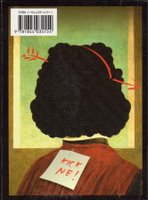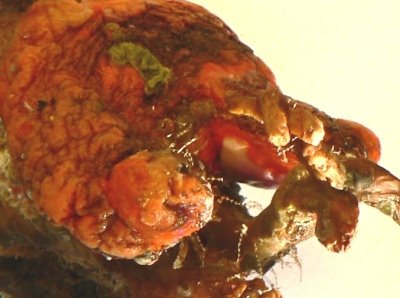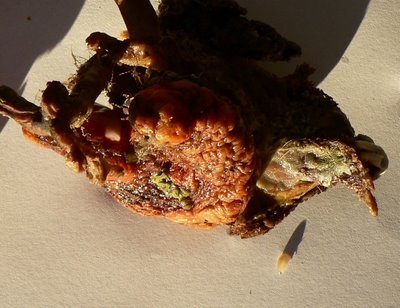22 July 2006
The value of a human life
The Shameful Evacuation
Western media fail to tell the real story in Lebanon
Understanding Israel in Gaza and Lebanon
"Congress backs Israel" (with a Resolution passed 410 to 8)—two points of view: US Congressmen Nick Rahall and Eric Cantor
Evacuation of Westerners from Lebanon: Why are We the Story?
The Daily Star
16 July 2006
"I cannot tell a lie"

"Human beings and higher apes . . . are the only species capable of intentional deception," writes Kathleen Carmody in the Sydney Morning Herald's guide, for Catalyst: How to Catch a Liar, an ABC TV Science production. Whether she sucked that fact out of her thumb or she copied their publicity blurb, it's time for this statement to be examined.
Is it intentional deception, or just instinctive?
The fact is, this limit of capability is a widely espoused "truth" commonly stated by scientists who regard other species as automatons and animal lovers who romanticise to the point that they also prefer not to look reality in the face.
Luckily, there are people like Eugene Linden. I am an uncomfortable reviewer, so won't try except to say this much.
1) I never recommend anything that I don't love.
2) I think the two books below are the antidote to the false statement about deception.
3) Reading anything by Eugene Linden is a joy and a perception-changing experience.
The Parrot's Lament : And Other True Tales of Animal Intrigue, Intelligence, and Ingenuity
and
The Octopus and the Orangutan
Any honest observer of other species comes across countless examples of deliberate deception, but here are just a few, from my personal experience.
L___, a puppy, was the kind of personality that makes insurance premiums high. After tumbling off a ledge, she had a sore leg for a day, but got so much cuddling that she decided to milk the sympathy by limping whenever she was in view. As soon as I realised that it was an act, the sympathy ended, and so did the limp.
Indian runner ducks sat and flapped their wings weakly ("Our legs are broken. We can't walk.") when they didn't want to be rounded up to go into their pen at night.
P_____, a cat, was a thief who stole for the enjoyment of sitting in the place where the theft had taken place and staring at humans with an expression of innocence. P____ also got away with the thefts for quite a while in the share-house, as one of the housemates had a guilty face.
B____, a cow, got out of a paddock, always an illicit joy. When the escape was discovered, B___ hid behind a tree. The only problem was that the tree was a sapling no thicker than a man's arm. When I reached the other side of the tree, the cow first put her head down, reasoning that if she couldn't see me, I couldn't see her. Then curiosity got the better of her, and she looked at me, and (warning: this is even more unscientific talk) we both (in our own way) laughed.
15 July 2006
"A balance of fear"
At a time when Americans still don't get it, voices like Kysia's and fellow American Rabbi Michael Lerner's try to be heard, but views like theirs as well as international friends of America and Israel who might be critical of policy are nixed in policy-making and the US mainstream press (and let's face it. US policy is part of the problem and could be part of the solution). There is a strong tone in the US press and American response of what they would call French nihilism if it weren't so homegrown.
Today's so-let's-not-concern-ourselves headline from CNN is "Decades of Conflict between Israel and Lebanon".

This isn't a time to be passive, nor to feign ignorance. It is a time to read read read read read read read read; to think about the difference between cant and reality, rhetoric and resolve; to speak up and to act, as Lerner urges in Israel has crossed a Moral Boundary. Here is an excerpt.
... Moreover, the outrage in Israel about this "kidnap"reflects a huge level of systematic denial going on in the consciousness of Israelis and many who support its policies because virtually every human rights group including the various Israeli human rights organizations has chronicled tens of thousands of acts of "kidnap" of this sort by the IDF against Palestinian civilians, who are then kept in detention for as long as six months without a trial, often facing brutal torture, and then released without ever having been charged with any crime. Of course, and I thank God for this because I care for the well being of the people of Israel , and as a Jew I am deeply tied to the success and safety of this particular Jewish society, the Palestinians have never been able to punish hundreds of thousands or millions of Israelis collectively for these systematic violations of human rights. To the extent that they do so through acts of terror, I condemn those acts.No nation has shadowed American policy post-9/11 (to the despicable orange jumpsuits) as much as Australia, yet:
This is a defining moment in our relationship with Israel for all Americans of whatever faith. Just as we need to make clear to our own government that its human rights violations in Guantanamo and Iraq are unacceptable, so we need to communicate to the Israeli people that the mass punishment of a million people for the acts of a few is as unacceptable when it comes from a democratic society as when it comes from the willful oppression of entrenched authoritarian dictators...
The moral legacy of the Holocaust has now passed into history. It can no longer be leveraged, in any way, in contemporary politics. The idea that members of the Jewish Diaspora can only be the victims of racism, rather than the practitioners of racism, like every other group, is now a dead letter and untenable. I write this as someone who has given support to Israel, and taken a hard line against Muslim racism, but can no longer draw any other conclusion than that the combustible policies of the Israeli Government have become a danger to Australia and to Australians everywhere." — Paul Sheehan, A petty crim who took on the world: Several dangerous trends are intersecting in the war on terrorism, The Sydney Morning Herald"It seems we're never gonna find peace in this region," says an Israeli (with two passports and a New York accent) behind me on the TV as I write this. Last night, however, the TV showed other Israelis in Israel, holding up signs to stop what could be called the inevitable. They didn't want it to be so. One brave guy's sign read, "Stop the madness."
I wrote this poem in 2000, and am disgusted that it is relevant as ever:
Nightingale Holocaust
As now as the next breath but one,
as everywhere as air:
Remember Us, Remember Us.
The Holocaust and milking it is hot hot hot.
The Mother of all Victims rules aloof
her jewelry of numbers blue
not earned by other victims too insignificantly nothing
to tattoo.
Enough already of Never Again.
If this sounds like a fart in shule
maybe I better bubble out again
until I fill the holy space of ark and torah scrolls with gas enough
to force a flight outdoors
and down the marble steps
into the arms of ghosts of dead
Armenians Cambodians Tutsis Balkans mixed
Ebos as remembered as a swarm of gnats long dead.
Lebanese abandoned. For their friendship with the Jews they'll disappear
but please don't concern yourself.
Of Diasporas, again there's only one.
Not Palestinians as freshly wronged as your last breath
by the helluva rousing echo of the Song of Lebensraum.
Who can talk?
We, who must.
Those of us who are
the tribe itself.
My great-grandfather rabbi stirs.
Sing, he says. For why is our might different than
any other's might when used so wrongly?
For We, he says,
are not the only ones pogrommed against,
the only Unwilling Wanderers
the only holocaust worth a flame.
Holocausts aplenty simmer now.
Swiss banks weep now. Stolen artworks creak.
But of those who sole possession was: themselves,
not even individuals but groups of bugs exterminant
how do lawyers settle the worth of life?
They don't. Never a gain.
My great-grandfather's name was Soloveichik
(Nightingale)
In his name I sing today
a short and many-noted Kaddish for all the Holocausts that were,
lit by tribal hate or maniacal despotism towards a people by their own.
And now, Enough Already for the dead, all equal in their tragedy of death.
With all the power of one little throat
I lift my voice for all the Holocausts to come.
Sir Richard: Standard Foreign Office response in a time of crisis. In Stage One we say that nothing is going to happen.This scenario doesn't need Sirs, nor that Foreign Office. All it needs is good people who do nothing.
Sir Humphrey: Stage Two, we say something may be going to happen but we should do nothing about it.
Sir Richard: Stage Three, we say that maybe we should do something about it, but there's nothing we can do.
Sir Humphrey: Stage Four, we say maybe there is something we could have done, but it's too late now.
— A Victory for Democracy, in Yes, (Prime) Minister by Jonathan Lynn and Antony Jay
13 July 2006
Professor Radhakhrishnan and the doghouse
2) Some earlier problems he had relate tangentially but I think importantly, to Hal Duncan's Cultural Appropriation essay (a posting which could, with the comments that followed, threaten the internet as we know it, giving online thought and discussion a good name).
3) This doghouse seems to be in mass production in some corner of hell, to be dropped like bibles to disaster victims, into institutions around the world. I've certainly seen it here, and I imagine you have, too. You might like to help the professor get out of it. He's very cramped because he's a feisty thing, as the good ones always are, and he bloody won't lie down.
Frogs and snails and cornstarch
Certainly, people don't seem to know that no frog will sit in a pot of water till the water boils, and then passively cook. Even snails, not known for their wisdom, if subjected to the same treatment, flee faster than would be thought possible by those who never think about snails, or if they see them, don't see them.
But try this experiment. No frogs or snails needed, and no heat. You only need a box of cornstarch and water, and your hand.
Empty the cornstarch into a small tray. Mix enough water with it so that all the powder is wet, and the surface goes flat.
Now ball your hand into a mighty fist and punch the daylights out of it. See what happens?
Now, stick your finger in it and stir your finger around.
* * * * * * * * * * * * * * * * * * * * * * * * * * * * * * * * * * * * * * *
"It was one of those still evenings you get in the summer, when you can hear a snail clear its throat a mile away."
— PG Wodehouse
11 July 2006
". . . reflect the views of the publisher"
 The Lowbrow Guide to World History by Michael Powell is a witty, potty history reverent to no one, including itself.
The Lowbrow Guide to World History by Michael Powell is a witty, potty history reverent to no one, including itself."Witty? Irreverent? Nontraditional? Even raunchy and sophomoric? Thankfully, yes! The Lowbrow Guide to World History reminds us how much we can learn when we remember not to take ourselves too seriously."

So sayeth the publishers' blurb, and the inside back cover adds
"Posing questions real people would ask...Powell gets to the bottom of legendary figures' motivations and methods and shows why we should still be interested in them today."
On the copyright page, facing the Contents page, is this disclaimer popular in some circles, such as the US Department of Defense:
"Publisher's note: The views expressed herein are the personal views of the author and are not intended to reflect the views of the publisher."
09 July 2006
In the name of . . .
 What god gives men blank cheques
What god gives men blank chequesto spend life liquidly in his name?
The same that sits calmly
watching almond trees
explode pink blossoms
into smoky skies
to snow upon
the rubbled flesh
of others of his
created.
What god
celebrates
his name being called
as the last act before murder —
the Act of our species.
We have created
the creature called War —
with a longer memory
than the elephant
and a longer tail
to lash the living
throughout the
generations.
What god pets this creature,
warms to its purr?
No god, for we were made —
our species — not for hating,
but to mate together.
God's-will,
we should be making mongrels now,
not war.
Rulers justified their conduct by making conquest a religious duty and giving credit for victory to their gods. 'Enlil did not let anyone oppose Sargon,' an Assyrian text asserts of the man who destroyed Israel in 722 BC. The Israelites, for their part, saw nothing outrageous in statements like this from Exodus: 'The Lord is a man of war; the Lord is his name.'
— Life in the Biblical World by Richard Walker, Reader's Digest, 1996
This excellent book casts enlightenment upon Truth. It is out of print, though it deserves a place in every library, especially now. "The laws of Moses and Hammurabi contain some striking parallels..."
"In the name of . . ." © Anna Tambour, first appeared in Jabberwocky, #1, July 2005
08 July 2006
A tyranny of cameras
V Woof (right)
I, of all photographers, should have been sensitive to the issue of reputation built on a pic, not to mention the almost unheard-of-today but nevertheless possible wish for privacy. After all, this spider made clearer than a whole nation of constantly photographed people, its resentment at being snapped in the act of living.
Whenever anyone says, "I saw a picture of you," they might as well drop a brick on my foot. It couldn't feel worse till they say, inevitably, "Now don't get upset. You don't look anywhere near as bad as you think."
Vanity! Now, everyone woman wants to hear what someone once told me. "You have a beautiful brain." And so I do admit to one photo of myself being something that I do like, my version of the side of Virginia that helped her quite a bit.
I think this has a rather Munchkinesque quality.
05 July 2006
Meaning in a universe — a human gut, a sea squirt, an 'undiscovered'
 'What we may call the 'lonely hypothesis" — that there is no rational and good God, and probably no God at all, that humankind is a speck of insignificance on the edge of a vast, pointless universe — has its own splendour, inspiration and self-justification. If nothing else will supply meaning in the universe, the existence and achievements of human intellect, creativity and love are quite enough.'
'What we may call the 'lonely hypothesis" — that there is no rational and good God, and probably no God at all, that humankind is a speck of insignificance on the edge of a vast, pointless universe — has its own splendour, inspiration and self-justification. If nothing else will supply meaning in the universe, the existence and achievements of human intellect, creativity and love are quite enough.'— Richard Koch and Chris Smith, "The fall of reason", New Scientist, 24 June 2006
Let's look at the question of meaning from the standpoint of the Methanobrevibacter smithii.
' "We are superorganisms containing a mixture of not just human cells but also bacterial cells and cells of another microscopic domain of life known as Archaea," says senior author Jeffrey Gordon, M.D., the Dr. Robert J. Glaser Distinguished University Professor. "As adults, the number of these bacterial and archaeal microbial cells exceeds the number of our human cells by tenfold. The genes present in this community of 10-100 trillion bugs vastly outnumber our own genes and are a key part of our genetic landscape, providing us with attributes we have not had to evolve on our own . . . . Buck Samuel, a doctoral student in Gordon's lab, began to probe the influence of Methanobrevibacter smithii, an archaeon. Originally identified in the 1970s and mistaken for a primitive form of bacteria, archaea initially became famous because of their ability to live in extreme environments where nothing else could survive, such as hot springs. Scientists first isolated archaea from the human intestine in 1982, and have recently recognized M. smithii as the most common archaeon in human intestines.'
— Gut microbes' partnership helps body extract energy from food, store it as fat, Science Daily, source: Washington University School of Medicine


Two days after being washed up on the shore, some of the inhabitants set off 'bravely' or possibly 'with a sense of desperation' or possibly as 'pointlessly' as their infinitely mysterious (to us) lives. Certainly, their movements had a sense of purpose, seen with the naked eye, though the one who throws a tall shadow here is only the size of a drop of water. As for the ones that we can't see, how many more, how complex their lives?
 An excellent book, Seldom Seen: Rare Plants of Greater Sydney by Alan Fairley (Reed New Holland, 2004) is filled with descriptions such as this:
An excellent book, Seldom Seen: Rare Plants of Greater Sydney by Alan Fairley (Reed New Holland, 2004) is filled with descriptions such as this:'The discovery of this species in 1984 is a good example of the right person in the right place at the right time.'
There are countless species that are 'undiscovered', and if they are waiting to be discovered, their wait gives new meaning to the meaning of 'wallflower'. Isn't the existence of what exists meaning without end? Isn't the wonder of mysteries undelved and if delved, mysterious as ever: infinitely wonderful? Isn't the fact that we have explored the world as thoroughly as a toothpick can span the Grand Canyon, more than enough to give purpose, to thrill, to awe? What a waste of wonder to look, instead, to 'God', let alone make meaning form around us humans, ever us as some centre of the universe— us, His ("I've finally got it!") masterpiece of Art, surrounded by his doodles.
"We like to think of evolution as progressive, but it is entirely possible that creatures with abilities as advanced as ours have come and gone before us." — Eugene Linden, in The Parrot's Lament and Other True Tales of Animal Intrigue, Intelligence, and Ingenuity




